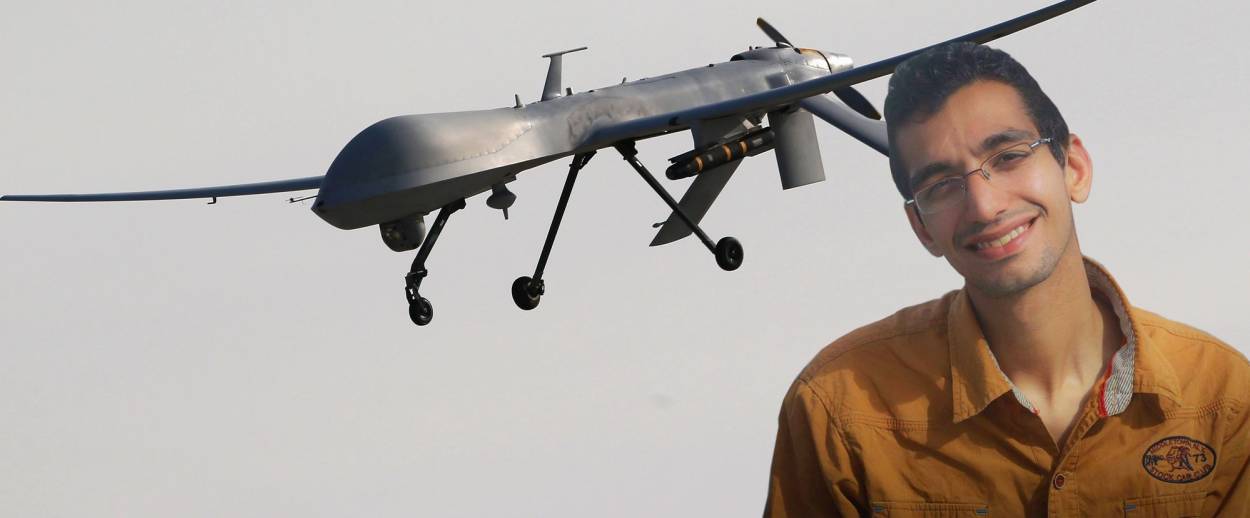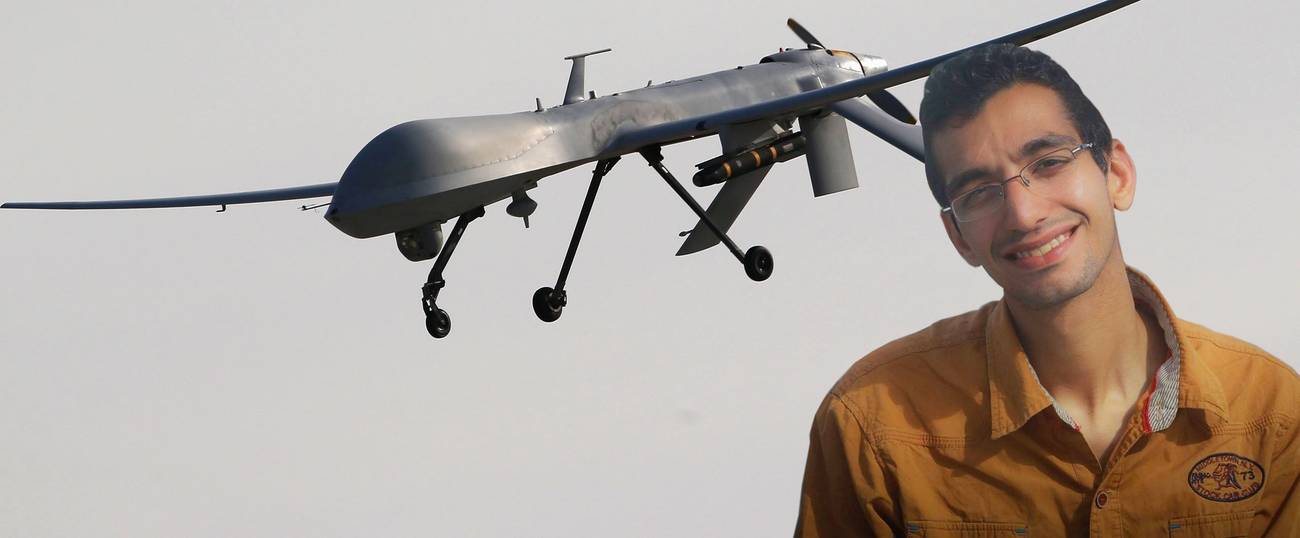Palestinian Teenager Hacks IDF Drones
Amateur computer nerd taps into satellite feed to give Islamic Jihad real-time HD access into Israeli military surveillance




Late last month, a 23-year-old Gazan man named Majad Awidah was making his way to a meeting with some singers. As the Palestinian casting director for Arabs Got Talent, the Middle East’s equivalent of American Idol, and the chairman of the Palestinian Talent Club, an organization for aspiring musicians and performers, Awidah spent most of his days holding auditions in a small room in an unassuming hotel in the center of Gaza City. It was important to him, he told a TV interviewer last year, to have Palestinians represented in talent shows on TV stations across the Arab world, proof that his beleaguered people were resilient and proud. But his artistic endeavors were interrupted: In an operation whose details have not yet been published, he was arrested by agents of the Shin Bet and sent to Israel to stand trial.
The charges against Awidah, detailed in an indictment filed yesterday to an Israeli court, read like the script of a fast-paced Hollywood movie. Side by side with his artistic endeavors, Awidah attended a local university and graduated with a dual degree in electrical engineering and computer science. Walking around town, he looked every bit the nerd, a gangly youth with a baby face, neatly cropped hair, and unfashionable oval glasses, always carrying around whatever discarded bits of hardware he managed to find. Classwork came easily for Awidah, and so he began to tinker, amusing himself and his friends with his crafty inventions. From time to time, he would display his creations, like a durable fire-fighting robot, in local electronics shows, trying to get someone to pay attention. And because Gaza is governed by murderous theocrats who snuff out all freedom and enterprise, the people Awidah was most interested in impressing were the bearded zealots who despotically command all of Gaza’s resources. If the mullahs paid attention, Awidah believed, they could help him further his career and he, in turn, could help them fight Israel.
Timidly, Awidah made overtures, but no one seemed to listen. Eventually, someone in the Islamic Jihad, the Iranian-backed terrorist organization that is the second most influential presence in Gaza after Hamas, noticed the excitable young man and, in 2011, offered him a job as a sound engineer and an occasional host on the group’s student radio station. Awidah was thrilled and did his job enthusiastically, recording everything from general interest shows to programs dedicated to the nefariousness of Jews. When the station shut down six months later he was despondent, but the Jihad found him another radio job that gave him a sense of self-worth and a steady paycheck, which paved the way to bigger and better things.
His first targets were Israel’s traffic cameras. A capable hacker, Awidah managed to break into the Israeli police’s intricate network of high-definition traffic cameras and developed software that enabled him to record and analyze everything he was seeing in real time. This, he proudly told his handlers in the Jihad, would enable the organization to track Israeli security forces on the move, as well as receive accurate data about Palestinian missiles fired at Israel, as the precise location of their landing and the exact damage they inflicted could now be viewed live. The Jihad higher-ups were pleased, but they had a more ambitious target in mind. Awidah’s goal, they told the smooth-chinned nerd, was to hack into the Israel Defense Forces’ drones.
Awidah was thrilled, but the challenge, he told his operators, would necessitate specialized hardware such as a frequency scanner, a satellite optic lens, and a high-performance laptop. Soon these items were all smuggled into Gaza, and Awidah began his work in earnest.
It took him weeks, but the ideas he used were simple. Because most military drones rely on satellites to communicate with command and control centers hundreds if not thousands of miles away, one need only hack into the satellite to intercept its feed. If this sounds complicated, it’s not necessarily so: In 2009, Iraqi insurgents used a piece of Russian software called SkyGrabber, available online for $26, to capture the surprisingly unencrypted video feeds of American military Predator drones. Because satellites communicate mainly via radio and microwave signals, the software—designed to intercept music, movies, and other entertainment broadcast via satellite—works just like a radio does when scanning the dial for a signal. When the insurgents hit on the drone’s frequency, they couldn’t down or disrupt it, but they could peep on everything the drone recorded in HD and in real time. Awidah tried a similar method. He failed the first time he tried to hack into the IDF’s system. He failed the second time as well. On his third try, he succeeded.
When Operation Pillar of Defense was launched in November of 2012, and with war raging between Israel and Hamas for seven days, Islamic Jihad terrorists most likely used Awidah’s technology to see everything the IDF was seeing via its unmanned aircraft. Immensely pleased, Awidah’s bosses informed him that he would be sent for some training in cyber-terrorism in Iran. Before he could depart for the Islamic Republic, however, a diplomatic conflict between Hamas and Tehran stopped all travel from Gaza to Iran, and Awidah was stranded at home. To pass the time, he took on new projects, such as trying to hack into Ben Gurion’s airport systems so that he could control commercial airlines or, at the very least, obtain detailed lists of each flight’s passengers. It’s yet unclear whether or not Awidah succeeded in that goal, but his attempts to infiltrate the Palestinian Ministry of the Interior’s system were much more fruitful, and he used data analysis software to locate individuals who may be prone to joining the jihad against Israel. These activities went on for several years, but on Feb. 23, traveling to yet another singing audition, Awidah was apprehended and taken to Israel.
Nabbing Awidah and bringing him to justice is a coup for the Israeli security services—the details of the operation aren’t yet clear—but Awidah’s success at hacking some of Israel’s most sensitive systems, and the fact that he did so using common tools and methods, is cause for alarm. It is true that Israel has considerably upgraded its cyber-security operations since 2014—from that year onward, Awidah was no longer able to hack the IDF’s drones—but the fact that a talented young man with very limited resources managed to gain so much access in the first place is still deeply concerning. As Israel prepares itself for future conflict, it’s not only the suicide bombers and the stabbers it should fear, but the smiley teens with bad haircuts, good laptops, and a spark of ingenuity.
***
Like this article? Sign up for our Daily Digest to get Tablet Magazine’s new content in your inbox each morning.
Liel Leibovitz is editor-at-large for Tablet Magazine and a host of its weekly culture podcast Unorthodox and daily Talmud podcast Take One. He is the editor of Zionism: The Tablet Guide.